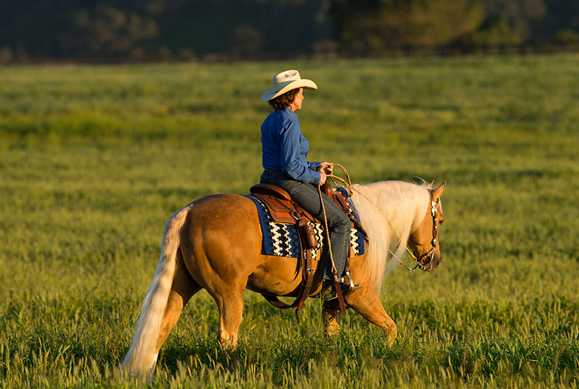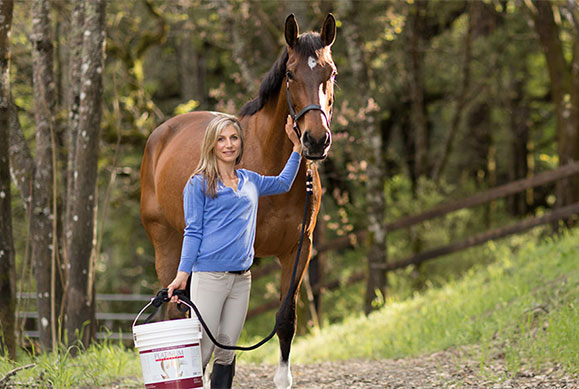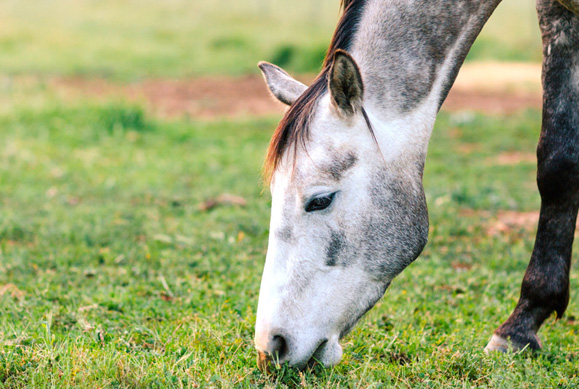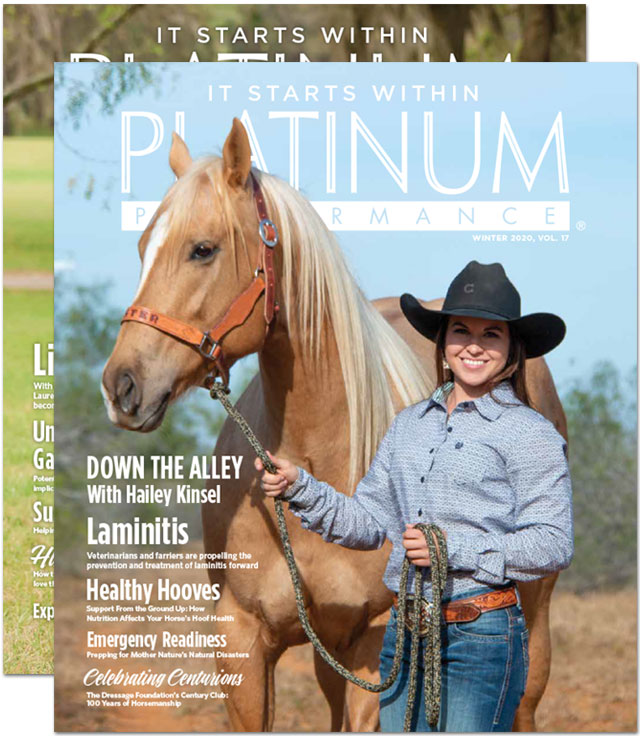Take the Worry Out of Feeding Horses
Equine nutrition is fascinating. At its most simple and foundational core, the equine diet provides all the building blocks for life. Because everything in the horse’s body is harmoniously interrelated, a deficiency of even a single micronutrient can, like a house of cards, cause several biological functions to operate improperly, or at the very least, not optimally. Nutrients can be used for therapeutic purposes or to influence equine athletic performance. Supplementation may also be used to balance a very typical diet as a preventative measure or as an insurance policy of sorts to ensure that the diet is complete. Even a natural grass diet may have lower levels of certain nutrients depending on season or geography. Most horse owners do not have a hay or pasture analysis, and it is impossible to know what may be lacking in forage just by looking at it. Using a reputable, veterinary-formulated, balanced and comprehensive equine wellness formula like Platinum Performance® Equine, Platinum Performance® CJ or Platinum Performance® GI may prevent problems from occurring and provide peace of mind to horse owners by taking the wonder, worry (and math) out of feeding horses.
Basic Equine Nutrition
Ideally, horses have free access to quality pasture that is full of the essential nutrients for good health. However, once pasture is cut and baled to make hay, many of the nutrients that make pasture such a perfect food for horses will decrease dramatically. The levels of vitamin E, omega-3 essential fatty acids and beta carotene, needed to make vitamin A internally, plummet once pasture is cut and dried. While hay is still an excellent feeding choice and is critical to satiate many important nutritional elements including calories, fiber and many minerals, levels of other nutrients may not be adequate. Adding back the critical nutrients lost in the baling process to satisfy base nutritional requirements in all ages and life stages of horses is a primary and most basic reason for supplementing a forage-based diet. A balanced and comprehensive multi-nutrient product like Platinum Performance® Equine can help compensate for the nutrients lost in pasture grasses after cutting.

Therapeutic Nutrition
Beyond fulfilling basic daily requirements, there are also therapeutic ways to use nutrition through targeted supplementation as a way to support specific health conditions. Horses that suffer from allergies may respond positively to quercetin and DHA supplementation, which provides support for an overactive immune response often seen with allergies. Using a healthy fat source for fuel, such as flaxseed oil, can be hugely cooperative for horses with myopathy issues or sugar sensitivities. Glucosamine, hyaluronic acid and MSM are oral supplements to address concerns with different areas of joint health. Pre- and probiotics are well known to support normal digestion and gut motility, and research is showing that they might holistically influence a great deal more than that. There is a wide spectrum of ingredients that can provide specialized support for horses in a variety of compromised states, supporting immunity and overall health.
Sports Nutrition
Sports nutrition is another intriguing area of supplementation. Nutrients can be provided in amounts exceeding those needed for basic requirements to optimize performance and facilitate recovery. Branched chain amino acids, HMB, gamma oryzanol and carnitine are examples of muscle-specific ingredients used to support muscle tone and recovery in horses in hard work or training. Antioxidants, like glutamine and natural vitamin E, provide an avenue for ridding excessive free radicals, a natural byproduct of exercising muscles, before spilling over the oxidative stress threshold of the inherent antioxidant defense system.
The Bottom Line
Feeding horses should not be complicated. Forage, like pasture and hay, is always a good feeding choice for horses and provides most of the basic nutrition needed for general health. And for anything that might be missing, there’s Platinum formulas.

by Emily Smith, MS,
Platinum Performance®
You May Also Like

Nutrient Finder
Learn about key nutrients for horse nutrition, including omega-3 fatty acids, vitamins, antioxidants, herbs and more
Read More
Vitamin E and Selenium Deficiency
Antioxidants beneficial for horses experiencing soreness, tying-up or residing in selenium-deficient areas
Read More
Feeding Frenzy: A Forage-First Approach
It's Time to Change Traditional Feeding; Forage as the Foundation, or Entirety, of the Diet is the Healthiest Choice.
Read More about a Forage-First Approach
